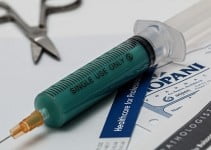You may notice that your headaches tend to increase around the time of your menstrual cycle. Is this just a coincidence or is there a connection?
There are a lot of symptoms we commonly associate with our menstrual periods, and most of them are unpleasant and often painful reactions to the hormonal imbalances happening at the time. Our menstrual cycles affect our bodies in many ways.
For example, the upset of hormonal levels can cause shifts in our body’s normal functioning processes, which can lead to various side effects. In fact, many women notice a link between their headaches and their periods, which is often caused by the hormonal changes taking place.
Why does it happen?
Headaches can be caused for various reasons, yet the main reason for the occurrence of those pesky menstrual headaches and migraines is the fluctuation of hormones throughout the cycle.
As you probably know, estrogen and progesterone are the key hormones involved in the menstrual process, and both hormones see a definitive drop as the period cycle approaches.
Estrogen is the most common culprit in causing these headaches, and when the levels of estrogen and progesterone begin to fluctuate, menstruating women become more likely to experience headaches.
Stress and anxiety brought on by symptoms of menstrual syndrome can also contribute to the severity of headaches. Stress can cause a lot of tension that, in turn, causes painful headaches to occur.
Women typically experience the worst of their menstrual headaches during the second and third stages of the cycle, and tend to be more severe right before their period is due. During this time, estrogen drops to its lowest levels right before the start of menstruation, which can trigger premenstrual migraines.
Women who take oral contraceptives typically experience more menstrual headaches as well because birth control pills highly influence estrogen levels.
In some cases, hormonal contraceptives can help reduce the severity of menstrual headaches by minimizing the dropping levels of estrogen during the menstrual cycle. Women using hormonal contraception methods may experience either side effect.
What are the symptoms?
Menstrual migraines are similar to regular migraines as they begin as a one-sided throbbing headache. Symptoms can develop into nausea, vomiting, and sensitivity to light.
Menstrual Syndrome Headaches typically occur right before your period arrives and is commonly associated with fatigue, acne, joint pain, decreased urination, constipation, and lack of coordination. These symptoms will likely reflect PMS symptoms.
Symptoms are usually seen to improve in women who are pregnant, most likely because of the high level of estrogen pregnant women possess. Menopause will likely trigger more of these migraines, however, since estrogen fluctuations during this time are a common occurrence. Headaches most likely won’t stop until the hormonal levels are at a stable low.
How can you treat it?
Headaches cannot be completely cured or treated, but medications are specifically used in treating the symptoms associated with them. Remedies and treatments for menstrual headaches vary on the severity of the attacks. Over-the-counter medications can often be used to alleviate some of the pain.
The most effective over-the-counter medications for treating these headaches are analgesics and medications specifically geared towards treating menstrual symptoms. Prescribed non-steroidal anti-inflammatory drugs such as Naprosyn, Orudis, Relefen, Nalfon, Motrin, and Advil are also helpful.
Holding a cold cloth or ice pack to the area of pain can also be useful in providing symptom relief. There are plenty of natural remedies to lessen the severity of headaches, such as relaxation exercises to mitigate stress levels, which could be contributing to the headaches, as well as acupuncture.
Women who experience severely debilitating menstrual migraines may seek prescription drugs from their doctor, such as NSAIDs or triptans, which are medications that block the pain signals in your brain. These drugs can help control the severe symptoms. It’s also a good idea to take preventative medication beginning a few days before your period and continuing throughout the cycle to help control some of the pain.
If most preventative measures are unsuccessful, some doctors might recommend hormonal therapy. This can help regulate the hormones working in your body and ensure that your hormones are at the right enough balance so severe fluctuations don’t result in a headache.
These usually consist of pill supplements of estrogen and progesterone. Steady estrogen levels can reduce the amount of headaches and overall relieve painful symptoms.
There are also a variety of supplements and vitamins that women take as preventative agents in treating symptoms of menstrual headaches.



